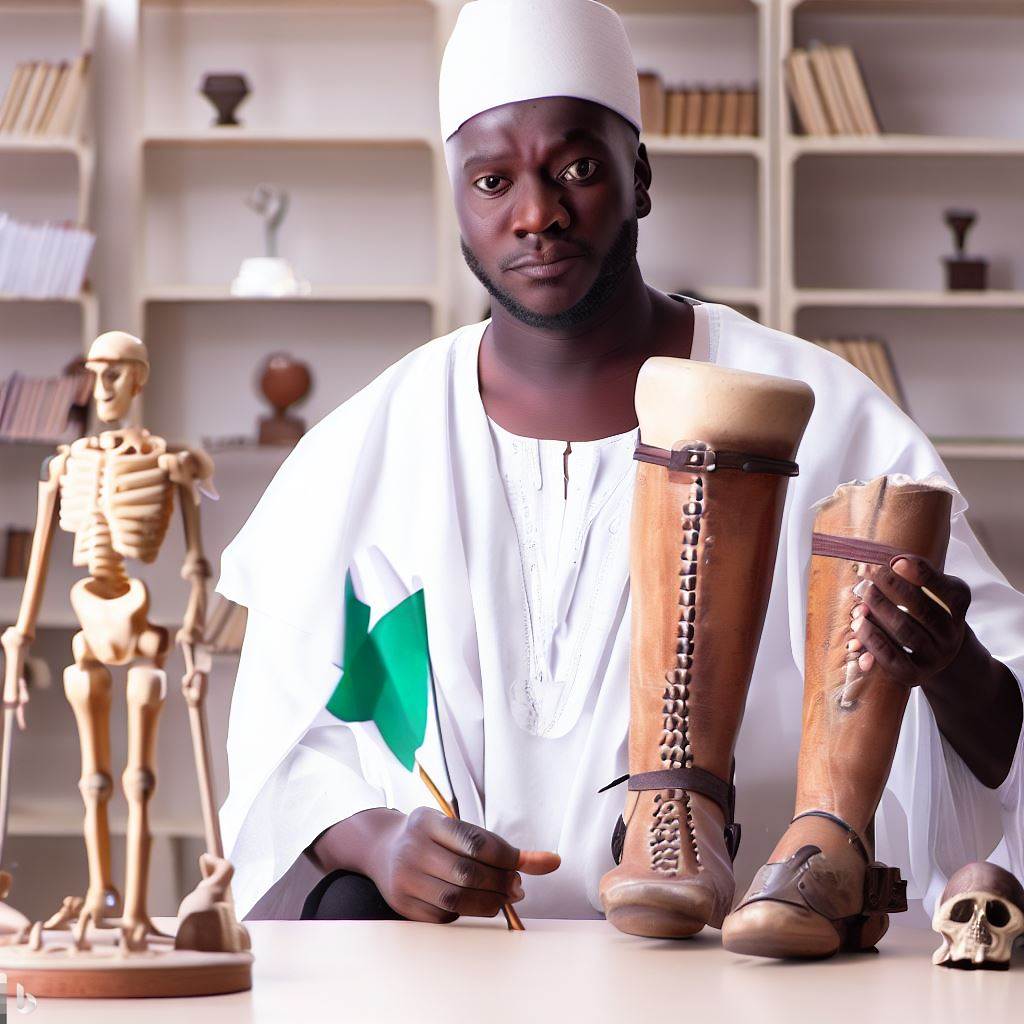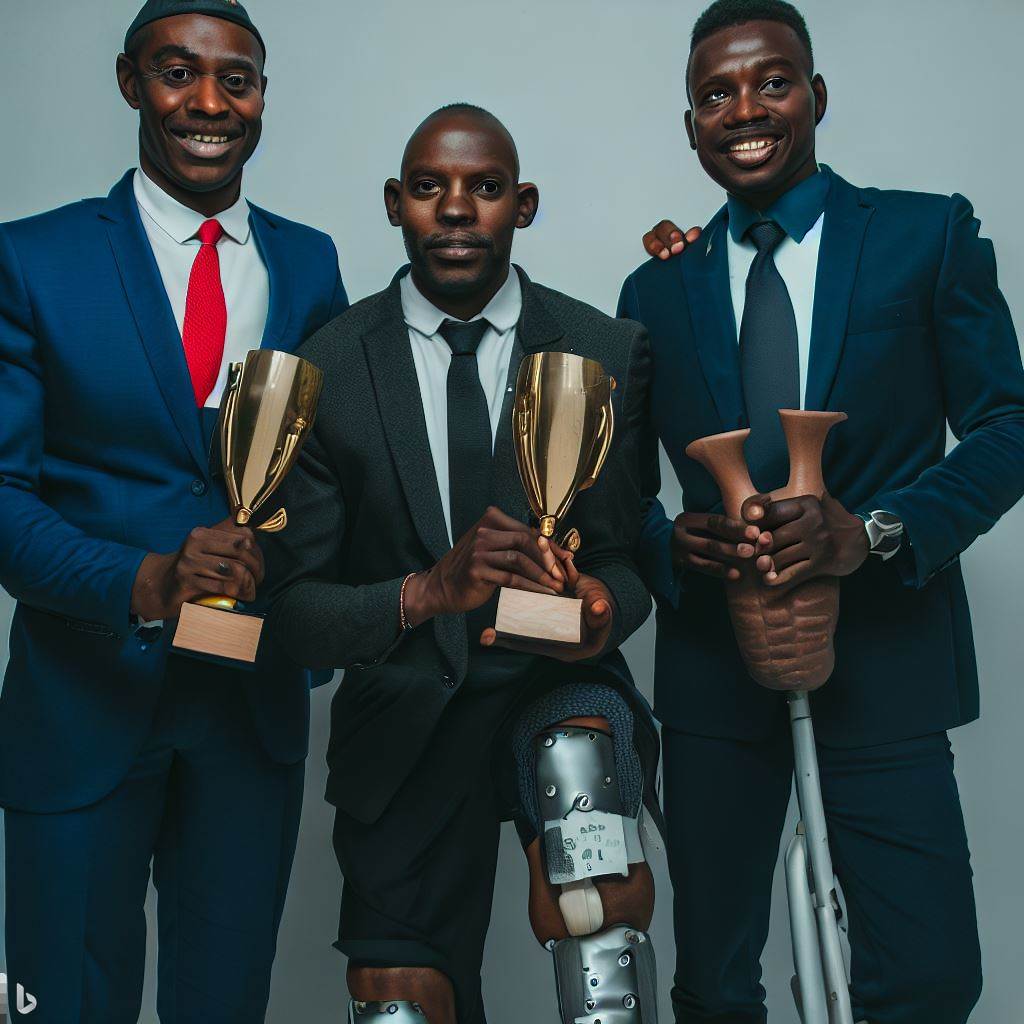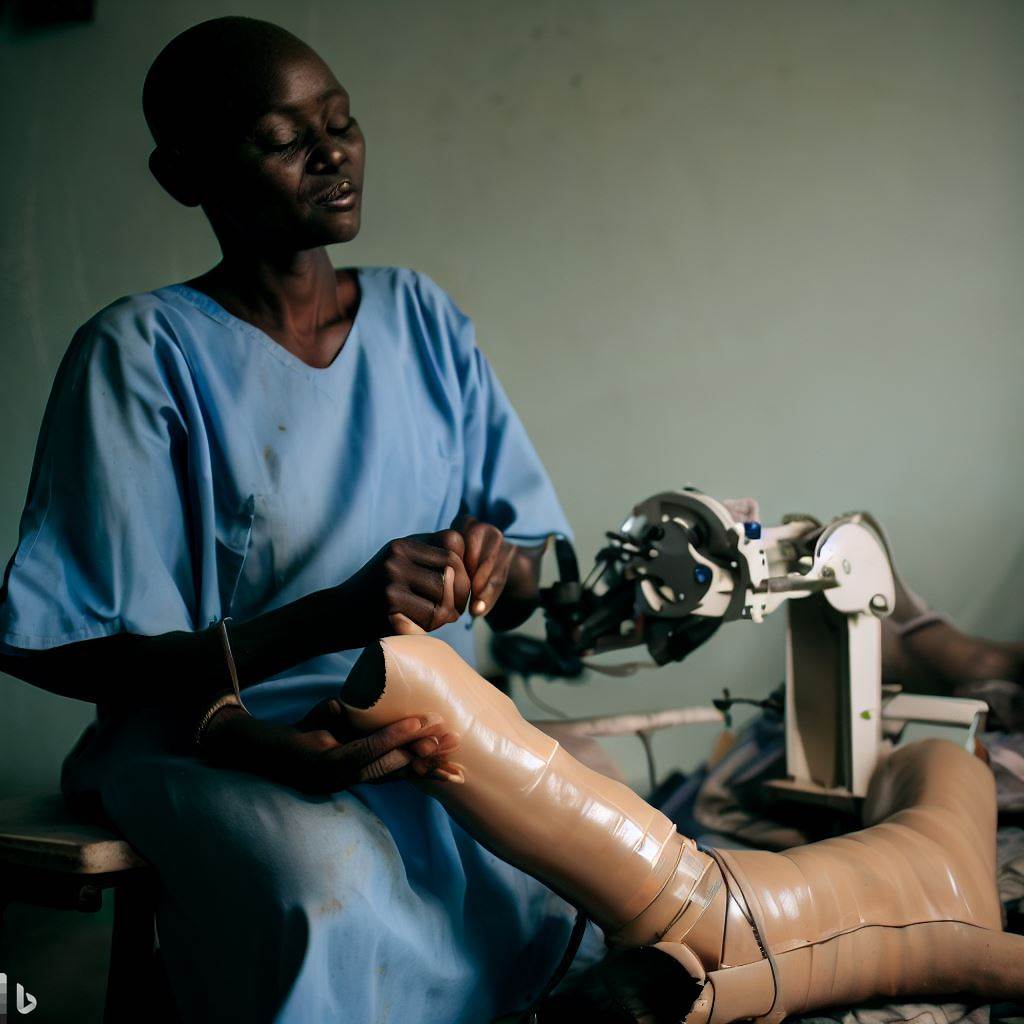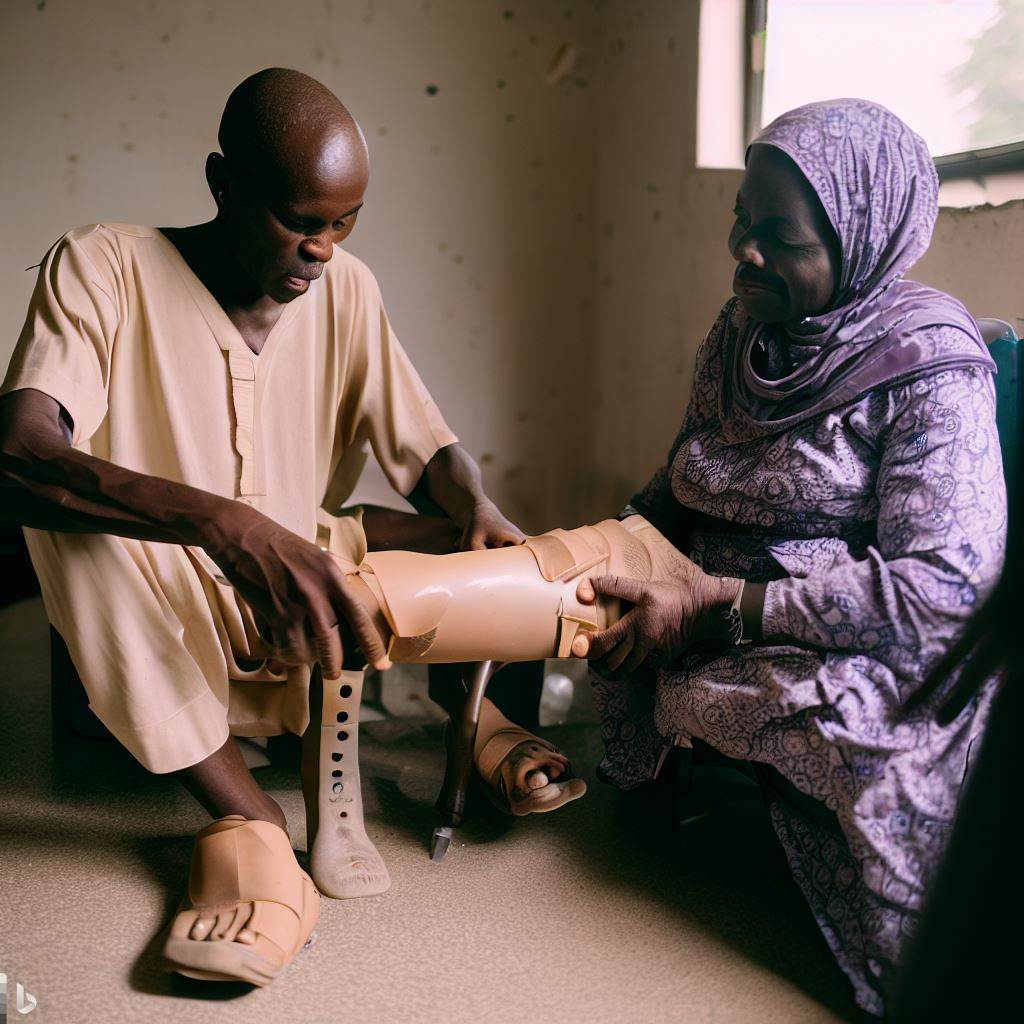Introduction
Nigeria’s orthotics and prosthetics industry has had a profound impact on the lives of individuals with physical disabilities, and this blog post provides a concise historical overview of the field.
In the precolonial era, orthotics and prosthetics were practiced using traditional methods in Nigeria.
However, advancements were limited due to the scarcity of resources and knowledge, with sorcery and spiritual beliefs playing a crucial role in shaping the field’s importance.
Through the ages, Nigeria’s orthotics and prosthetics industry has evolved significantly, embracing modern technologies and scientific understanding.
Today, it continues to make a profound impact on the lives of individuals with physical disabilities, empowering them to lead more fulfilling lives.
Recognizing the historical context of orthotics and prosthetics in Nigeria sheds light on the industry’s progress and underscores its critical role in positively transforming lives.
Read: Top 10 Highest Paying Professions in Nigeria: 2023 Edition
Precolonial Era
Traditional methods of orthotics and prosthetics in Nigeria
Indigenous communities in Nigeria developed their own methods for creating orthotics and prosthetics.
They passed these methods down through generations, often keeping them secret within specific families or communities.
Traditional orthotics used natural materials like wood, animal bones, and fibers to create supportive devices.
Indigenous Nigerian orthotists and prosthetists were highly skilled craftsmen who used carved wood or animal horns to create functional and sturdy devices, which were then attached to the affected limb as prosthetics.
Importance of sorcery and spiritual beliefs in the field
In the precolonial era, sorcery and spiritual beliefs played a significant role in the practice of orthotics and prosthetics in Nigeria.
Many people believed that disabilities were caused by evil spirits or curses, leading them to seek spiritual interventions alongside physical treatments.
Traditional orthotists and prosthetists often combined their craftsmanship with spiritual rituals to ensure the effectiveness of their devices.
These spiritual rituals included prayers, sacrifices, and the use of herbs and charms to ward off evil spirits and promote healing.
Nigerian culture deeply rooted the integration of spiritual beliefs into orthotics and prosthetics, providing individuals with disabilities a sense of hope and comfort.
Limited advancements due to lack of resources and knowledge
Despite the ingenuity and effectiveness of traditional methods, the field of orthotics and prosthetics in precolonial Nigeria faced limitations.
Specifically, the lack of resources and knowledge hindered the development of more advanced devices and techniques.
Moreover, indigenous orthotists and prosthetists relied solely on locally available materials, which restricted their capabilities.
Additionally, there was a limited understanding of anatomy and biomechanics, which affected the precision and functionality of the devices.
Furthermore, the absence of formal education and training programs prevented the widespread dissemination of knowledge within the field.
Therefore, the precolonial era in Nigeria witnessed the development of traditional methods of orthotics and prosthetics.
Despite these challenges, indigenous communities relied on their craftsmanship and spiritual beliefs to create functional devices.
Nonetheless, the field faced limitations due to the lack of resources, knowledge, and formal education.
Nevertheless, the practices of the precolonial era laid the foundation for the advancement of orthotics and prosthetics in Nigeria.
Read: Challenges and Solutions in Nigeria’s Social Work Practice
Colonial Era
During the Colonial Era, Nigeria experienced the introduction of Western medicine and modern orthotics/prosthetics.
European missionaries and healthcare workers played a significant role in influencing healthcare practices in the country.
Additionally, this era witnessed the development of basic orthotic and prosthetic devices in Nigeria.
Introduction of Western medicine and modern orthotics/prosthetics
With the arrival of colonial powers, particularly the British, Western medicine made its way into Nigeria.
This introduction brought forth modern orthotics and prosthetics, which significantly improved healthcare practices in the country.
Nigerian healthcare professionals began learning and adopting these new technologies.
The use of modern orthotics and prosthetics provided individuals with physical disabilities increased mobility and functionality.
This development positively impacted the lives of many Nigerians, especially those who had previously been reliant on traditional methods of care for their disabilities.
Influence of European missionaries and healthcare workers
European missionaries and healthcare workers greatly influenced healthcare practices in Nigeria during the Colonial Era.
These individuals played a crucial role in the introduction and promotion of modern orthotics and prosthetics.
European missionaries, often educated in Western medicine, played a crucial role in providing healthcare services that incorporated modern orthotics and prosthetics.
This not only improved the quality of care but also served as a form of evangelism to spread Christianity.
Healthcare workers from Europe who came to Nigeria for various reasons, such as research or development initiatives, also shared their expertise in orthotics and prosthetics.
They trained Nigerian healthcare professionals, empowering them to provide better care to the local population.
Development of basic orthotic and prosthetic devices in Nigeria
During the Colonial Era, Nigeria witnessed the development of basic orthotic and prosthetic devices within the country.
Nigerian healthcare professionals, influenced by Western medicine, started experimenting with local resources to create these devices.
Limited resources and access to advanced technology led to the crafting of basic orthotic and prosthetic devices using materials such as wood, leather, and metal.
These homemade devices were effective in providing support and mobility to individuals with disabilities.
This development marked the beginning of Nigeria’s journey towards becoming more self-sufficient in the production of orthotic and prosthetic devices.
It laid the foundation for the future growth of the field and set the stage for advancements in orthotics and prosthetics in the country.
Overall, the Colonial Era in Nigeria brought about the introduction of Western medicine and modern orthotics/prosthetics.
European missionaries and healthcare workers played a significant role in promoting these practices.
The development of basic orthotic and prosthetic devices within Nigeria showcased the country’s potential in the field and set the stage for future advancements.
Read: Top Orthotic and Prosthetic Institutions in Nigeria

Independence and Post-Independence Era
Formation of Nigerian Orthotic and Prosthetic Association (NOPA)
The period following Nigeria’s independence marked a significant milestone for the country’s orthotics and prosthetics sector.
In response to the growing need for organized support and collaboration, the Nigerian Orthotic and Prosthetic Association (NOPA) was formed.
NOPA aimed to provide a unified voice for professionals in the field and promote the development and advancement of orthotics and prosthetics in Nigeria.
The association played a pivotal role in advocating for the rights of practitioners and ensuring high standards of practice.
Read: The Journey to Becoming a Registered Nurse in Nigeria
Collaboration with International Organizations for Technological Advancements
Recognizing the need to leverage international expertise and technological advancements, Nigeria’s orthotics and prosthetics sector actively sought collaborations with international organizations.
These partnerships were instrumental in enhancing the quality of services and expanding access to advanced technologies within the country.
Through collaborations with renowned organizations such as the International Society for Prosthetics and Orthotics (ISPO), Nigeria benefited from knowledge exchange programs, training opportunities, and access to state-of-the-art prosthetic and orthotic devices.
These collaborations played a crucial role in bridging the technological gap between Nigeria and more developed countries in the field.
Establishment of Orthotic and Prosthetic Schools and Training Programs
Recognizing the need for skilled professionals and comprehensive training programs, Nigeria established orthotic and prosthetic schools and training programs.
These institutions aimed to equip individuals with the necessary knowledge and skills to address the growing demand for orthotic and prosthetic services.
The establishment of these institutions not only facilitated the education and training of local professionals, but also contributed to the overall growth and development of the sector.
In addition, through these schools and training programs, Nigeria was able to produce a new generation of highly skilled orthotists and prosthetists, which helped to address the shortage of qualified practitioners in the country.
In review, the independence and post-independence era in Nigeria witnessed significant progress in the field of orthotics and prosthetics.
The formation of the Nigerian Orthotic and Prosthetic Association (NOPA) provided a platform for collaboration and advocacy, while partnerships with international organizations fostered technological advancements.
The establishment of orthotic and prosthetic schools and training programs further contributed to the growth and development of the sector.
These efforts have laid the foundation for a robust orthotics and prosthetics sector in Nigeria, improving the quality of life for individuals in need of these services.
Read: Becoming a Prosthetist/Orthotist in Nigeria: Steps & Tips
Challenges and Progress
Limited access to quality devices in rural areas
Rural areas in Nigeria face a significant challenge in accessing high-quality orthotic and prosthetic devices.
The lack of specialized healthcare facilities and trained professionals makes it difficult for individuals in these areas to obtain quality devices.
Furthermore, the cost associated with these devices poses an additional barrier for people living in rural areas, who often have limited financial resources.
The situation leaves many individuals with disabilities in these regions with substandard or inadequate devices, impacting their mobility and overall quality of life.
Efforts to address this challenge have involved collaborations between nonprofit organizations, governmental agencies, and international partners to establish outreach programs.
These programs aim to provide training and resources to local healthcare providers, enabling them to fabricate and fit orthotic and prosthetic devices in rural areas.
Mobile clinics and telehealth services have also been utilized to bring orthotic and prosthetic services closer to individuals living in remote regions.
These initiatives help bridge the gap between urban and rural healthcare services, ensuring that those in need have access to quality devices.
Lack of awareness and understanding of orthotic/prosthetic benefits
Another challenge in Nigeria is the lack of awareness and understanding of the benefits offered by orthotic and prosthetic devices.
- Individuals in rural communities may not be aware of the options available to them or the positive impact these devices can have on their lives.
- This lack of awareness leads to underutilization of orthotic and prosthetic services.
- Many individuals do not seek or access the devices they need.
- This further perpetuates the cycle of limited understanding and availability of these services.
To address this challenge, organizations have implemented education and awareness campaigns to disseminate information about the benefits of orthotic and prosthetic devices.
- These campaigns target individuals with disabilities and their families, as well as healthcare providers and community leaders.
- By increasing knowledge and understanding, these initiatives aim to empower individuals to seek appropriate orthotic and prosthetic care.
Furthermore, partnerships between government institutions, international organizations, and local communities have been formed to develop and implement inclusive policies.
- These policies aim to ensure that healthcare systems recognize and prioritize the needs of individuals requiring orthotic and prosthetic devices.
- Ultimately, this will improve access and enhance understanding.
Efforts to address these challenges and improve accessibility
Various efforts have been undertaken to overcome the challenges faced in Nigeria regarding orthotic and prosthetic accessibility.
- Technological advancements have played a crucial role in improving accessibility. Low-cost, customizable 3D-printed prosthetics have been developed, revolutionizing the field and making prosthetic devices more affordable and accessible to a wider population.
- Partnerships between local authorities, nonprofit organizations, and international partners have resulted in the establishment of rehabilitation centers and specialized clinics. These facilities provide comprehensive orthotic and prosthetic services, ensuring high-quality devices and expert care.
- Training programs have also been implemented to enhance the skills and knowledge of healthcare professionals in the field of orthotics and prosthetics. By investing in training and education, Nigeria is building a sustainable workforce that can cater to the growing demand for these devices.
- Furthermore, community engagement and involvement have been integral in addressing these challenges. Local communities, advocacy groups, and individuals with disabilities are actively raising awareness, advocating for improved services, and reducing stigma associated with orthotic and prosthetic devices.
Overall, while challenges persist, Nigeria has made significant progress in addressing the limited accessibility of orthotic and prosthetic devices.
Through collaborative efforts, awareness campaigns, technological advancements, and community engagement, the country is taking positive steps toward ensuring that all individuals have equal access to the devices and care they need for improved quality of life.
Read: The Role of a Medical Lab Technician in Nigeria’s Healthcare
Recent Innovations and Achievements
Introduction to Advanced Technology in Orthotics/Prosthetics
Advanced technology has revolutionized the field of orthotics and prosthetics in Nigeria.
Specifically, new materials, such as carbon fiber, have made prosthetic limbs lighter, more durable, and comfortable.
Moreover, computer-aided design and manufacturing (CAD/CAM) have improved the precision and customization of orthotic and prosthetic devices.
Additionally, sensor technology allows for the development of smart prosthetics that can detect and respond to the user’s movements.
Furthermore, 3D printing has made it possible to create affordable and customized orthotic and prosthetic devices.
Success Stories of Nigerian Orthotic and Prosthetic Practitioners
- Dr. Adeniyi Onayemi, a Nigerian orthopedic surgeon, developed an innovative knee brace that provides pain relief and improved mobility for people with osteoarthritis.
- Victor Agoti, a prosthetist in Nigeria, designed a low-cost prosthetic foot using locally available materials, which improved accessibility for lower-income amputees.
- Dr. Bose Adekanye, an orthotist, developed a custom-fitted wrist brace that significantly reduced pain and improved function for individuals with carpal tunnel syndrome.
- Oluwatosin Ojo, a Nigerian prosthetist, successfully fitted a young boy with a 3D printed arm, which restored his ability to perform daily tasks with ease.
These success stories highlight the ingenuity and dedication of Nigerian orthotic and prosthetic practitioners in improving the lives of their patients.
Read: How to Become a Medical Lab Technician in Nigeria
Contributions to the Global Orthotics and Prosthetics Community
- Nigerian orthotic and prosthetic practitioners actively participate in international conferences and workshops. They share their expertise and experiences with other professionals from around the world.
- Dr. Uchechukwu Ogbala, an orthopedic surgeon, presented a research paper on the use of advanced prosthetic technology at the International Congress of Orthotics and Prosthetics. The paper was well-received by the audience, and Dr. Ogbala’s work was praised for its innovative approach.
- The Nigerian Society of Orthotics and Prosthetics (NSOP) regularly collaborates with global organizations to promote research and development in the field. These collaborations have led to the development of new technologies and treatment methods that have improved the lives of individuals with disabilities.
- Through such collaborations, Nigerian practitioners have contributed to the development of international standards and guidelines for orthotics and prosthetics. These standards and guidelines help to ensure that individuals with disabilities receive the best possible care.
- Nigeria’s orthotic and prosthetic community actively engages in knowledge exchange with professionals from other countries. This knowledge exchange fosters innovation and advancements in the field worldwide.
- In fact, recent innovations in orthotics and prosthetics in Nigeria have significantly enhanced the quality of care provided to individuals with disabilities. These innovations have made it possible for individuals with disabilities to live more independent and fulfilling lives.
- Advanced technologies, success stories of Nigerian practitioners, and contributions to the global orthotics and prosthetics community are testaments to the country’s progress in this field. In the years to come, Nigeria is poised to continue making positive contributions to the global orthotics and prosthetics community.
Read: Advancing Your Career: Medical Lab Technician in Nigeria
Conclusion
Nigeria’s orthotics and prosthetics field has had a remarkable historical journey. In the early days, people with disabilities had limited options for assistive devices.
However, advancements have significantly improved accessibility, and Nigeria has come a long way.
Continuous advancements and accessibility play a crucial role in improving the quality of life for individuals in need.
The orthotics and prosthetics field must continually innovate and strive to create devices that are not only effective but also readily accessible to all Nigerians. This means addressing the challenges of affordability, availability, and distribution.
Today, we have reasons to be hopeful for a future where every Nigerian in need can access appropriate orthotic and prosthetic devices.
Technological advancements, coupled with the efforts of various organizations and professionals in the field, have paved the way for greater accessibility and affordability.
However, there is still work to be done. Policymakers, healthcare providers, and charitable organizations must collaborate and formulate strategies that ensure access to orthotics and prosthetics for all Nigerians in need.
This includes reducing the cost of production, expanding healthcare coverage, and establishing rehabilitation centers equipped with trained professionals across the country.
By prioritizing the needs of individuals with disabilities and forging a collective commitment towards their well-being,
Nigeria can aspire to a future where every person in need can lead a fulfilling life with the support of appropriate orthotic and prosthetic devices.




